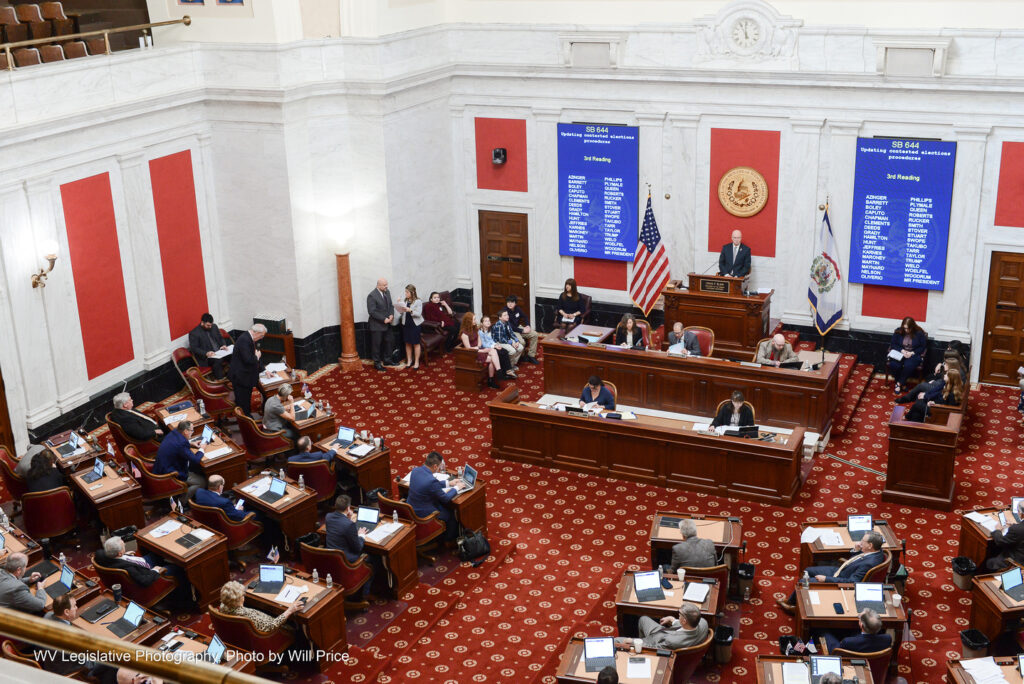The West Virginia Senate passed three bills Thursday related to elections in the state.
All three bills originated from the Secretary of State’s office as technical cleanups.
Senate Bill 620 makes just four changes to state code that would increase the maximum number of registered voters per precinct, as well as the distance between polling places.
Sen. Charles Trump, R-Morgan, chair of the Senate Judiciary Committee and the bill’s lead sponsor, said the bill increases the maximum number of voters in an urban precinct from 1,500 to 2,500, and allows for greater consolidation of precincts.
“There’s also authority under this bill for counties, county governments, county commissions to consolidate precincts. But there are limitations on the geographical distance,” Trump said. “The consolidated precinct cannot contain more than 5,000 total – that’s up from 3,000 registered voters – and under existing law, there’s a one mile radius limit. This would expand that to five miles. It’s all permissive. It would be up to the county commissions to decide whether or not to do that when they exercise the statutory authority of drawing and configuring the voting precincts in their respective counties.”
During discussion of the bill in the Senate Judiciary Committee on Feb. 17, Sen. Mike Caputo, D-Marion, expressed concern that the consolidation of polling places the bill allows would create undue burdens on voters.
“I think it’s our job to make voting easier for our constituents, not to add what I think could be a cumbersome task,” he said. “I get that you’ll move the machines to one precinct, if you consolidate. I still think there could be bottlenecks at check-in. It would appear that we are doing things to make it more difficult for the voter.”
The bill ultimately passed on a vote of 27 to 7. All three Democratic senators were joined by Republican senators Jason Barrett of Berkeley, Laura Chapman of Ohio, Patrick Martin of Lewis and Ben Queen of Harrison in voting against the bill.
The Senate also passed Senate Bill 631, which would facilitate the state’s use of federal money from the Help America Vote Act in federal elections. Also known as HAVA, Trump said the bill was passed by Congress after the 2000 presidential election to help facilitate vote counting in states.
“As the technology of voting machines has become more advanced, they become more expensive. And so in West Virginia, the voting machines that are used by the 55 counties are purchased with combinations of county monies and federal monies,” he said. “This will allow the secretary of state to utilize federal monies that come into the secretary of state’s possession for that purpose.”
Senate Bill 631 also extends the deadline for when county clerks can accept voter registrations on the final day of registration by a few hours, from close of business to midnight.
Senate Bill 644, which aims to clarify the procedure for contested elections, also passed.
“In short, what this bill does is it moves to the courts the place where election contests occur,” Trump said. “If there’s an election contest from a municipal election, the current law is that it’s decided first by the mayor and council. Contests of elections involving the county and district contests, current law is that they’re decided in the county court. This moves all that to circuit court.”
All three bills now go to the House of Delegates for consideration.
Support For Diabetics
The Senate also took up two bills to address issues around diabetes in the state.
Senate Bill 195 would allow a licensed healthcare provider to prescribe ready to use glucagon rescue therapy in a school, or in a school district’s name, to treat severe hypoglycemic episodes.
The bill also sets forth procedures for administering glucagon, including the requirement that a school nurse approve its administration, and authorizes school personnel to receive training on assisting students in diabetes care and how to identify and react to a student experiencing a diabetes related emergency.
Senate Bill 577 would limit the cost sharing for a covered prescription of insulin to a total of $35 for a 30-day supply, and $100 for a 30-day supply for covered diabetic devices.
Senate Health and Human Resources Chair Sen. Mike Maroney, R-Marshall, said the bill would apply to West Virginians that currently have private health insurance.
“Our bill applies to private insurance, the 20 percent of West Virginians that have commercial insurance, roughly. That’s what this bill applies to,” Maroney said. “Medicare already has it. PEIA has similar ranges. I can’t answer Medicaid.”
The Inflation Reduction Act capped the cost of insulin at $35 per month for Medicare beneficiaries starting in 2023.
Maroney said a similar bill passed the Senate last year but failed to complete legislative action.
Both bills passed and now head to the House of Delegates for consideration.




















